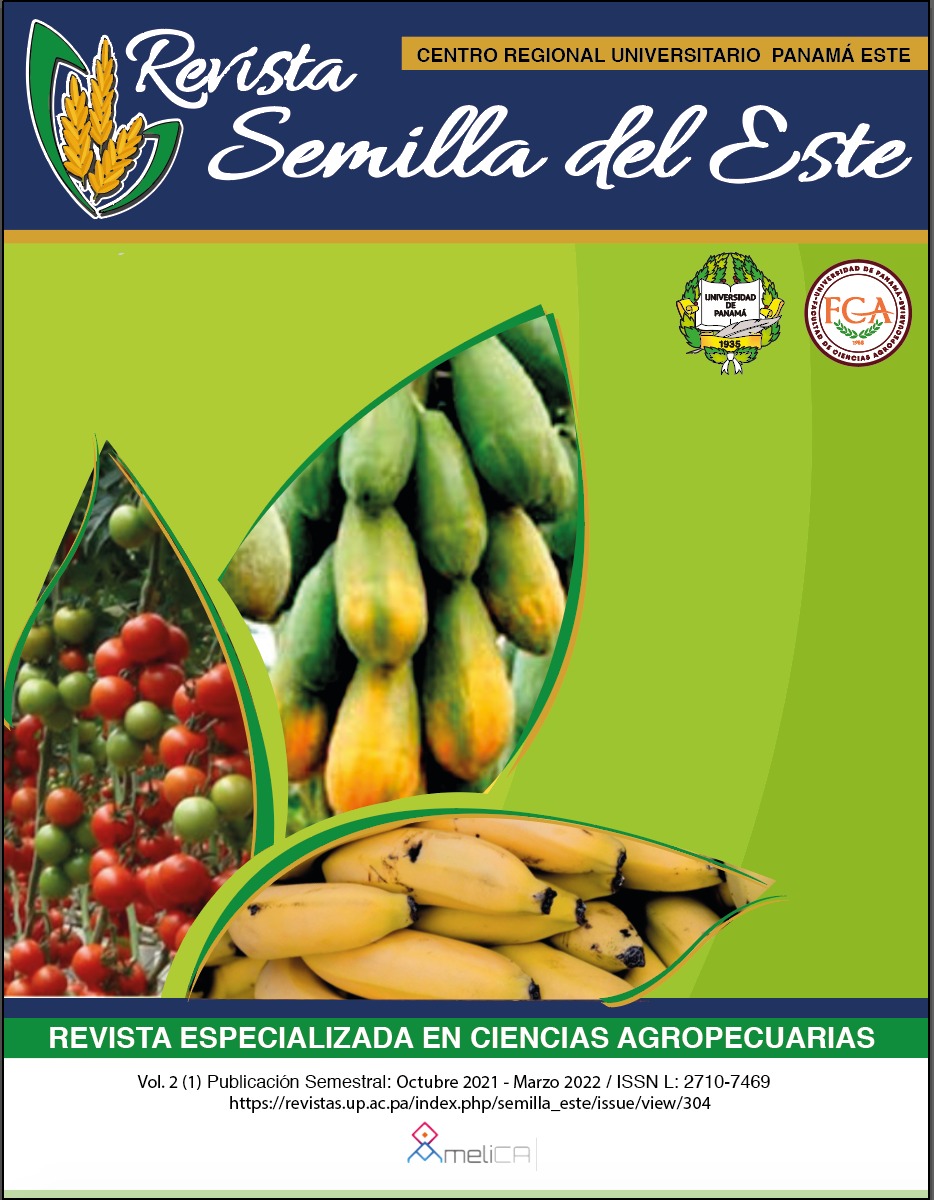References
Anónimo. (1988). Manual de fertilidad de suelos. Potash & Phosphate Institute. Georgia. USA, 85 p.
Atlas de las tierras secas y degradadas de Panamá. Comité Nacional de Lucha contra la Sequía y la Desertificación (CONALSED). Autoridad Nacional del Ambiente (ANAM).
https://edo.jrc.ec.europa.eu/gisdata/scado/land_degradation/pa/ATLAS_DESERTIFICAC ION.pdf
Castilla, F. (2013. La elegida para conservar el suelo. Una decisión agronómica que combina rotación de cultivos, fertilizantes y agricultura de precisión para aumentar la producción y preservar los recursos naturales. Adoptada en forma masiva en la Argentina, es una de las claves para evitar pérdidas del suelo por erosión. RIA. Revista de Investigaciones Agropecuarias, 39 (2), 118-123. https://www.redalyc.org/articulo.oa?id=86429344002
Centro Nacional de Competitividad (CNC). (2014). Edición No. 172. Evolución del mercado agrícola de Panamá y la importancia de la competitividad del sector. https://cncpanama.org
Cotler, H., et al. (2007). La conservación de suelos: un asunto de interés público. Gaceta Ecológica, (83), 5-71. https://www.redalyc.org/articulo.oa?id=53908302
Etchvers, J., et al. (2015). Capítulo 4: Manejo sustentable del suelo para la producción agrícola. Colegio de Postgraduados (CP), Campus Montecillo. Estado de México, México. 63- 79. Consultado el 21 de agosto de 2021. https://www.researchgate.net/publication/304581117 Graetz, H. A. (1997). Suelos y Fertilización. Traducido por: F. Luna Orozco. Trillas. México. 80
p.
Grajales, W. (2015). Degradación en Panamá: una amenaza al bienestar de todo. Centro Nacional de Competitividad (CNC). http://cncpanama.net/bitstream/handle/123456789/746/maeyap5.pdf?sequence=1
Groz, A. y Domínguez, A. (1992). Abonos guía práctica de la fertilización. 8va edición. Ediciones Mundi-Prensa. Madrid. 450p.
Instituto Nacional de Estadística y Censo. (2012). Boletín No. 13: Estimaciones y proyecciones de la Población total por sexo y edad; 1950-2050.
https://www.inec.gob.pa/publicaciones/Default3.aspx?ID_PUBLICACION=474&ID_CA TEGORIA=3&ID_SUBCATEGORIA=10
Lopes, A., et al. (2012). The saga of the agricultural development of the brazilian Cerrado. Electronic Science of America Fertilizer Correspondent, n. 32, 29-57.
https://www.ipipotash.org/publications/eifc-261
Lopes, A.; Guilherme, L. (2016). A career perspective on soil management in the Cerrado Region of Brazil. Advances in Agronomy, v. 137, 1-172.
http://repositorio.ufla.br/jspui/handle/1/32241
Pietola, L; R Horn y M Yli-Halla. (2005). Effects of trampling by cattle on the hydraulic and mechanical properties of soil. Soil Till. Res. 82: 99–108.
Ruiz, G. (2019). La erosión de los suelos en Panamá y sus impactos. El Tecnológico, 28(1), 14-
16. https://revistas.utp.ac.pa/index.php/el-tecnologico/article/view/2116
Taboada, M. (2007). Efectos del pisoteo y pastoreo animal sobre suelos en siembra directa. 4º Simposio de Ganadería en Siembra directa. AAPRESId. Potrero de los funes, San Luis,
71-83. Consultado el 10 de septiembre de 2021. http://www.produccionbovi- na.com.ar/suelos_ganaderos/49-efectos_pisoteo.pdf
Villarreal, J., Name, B., & García, R. (2013). Zonificación de suelos de Panamá en base a niveles de nutrientes. Ciencia Agropecuaria, (21), 71-89.
http://www.revistacienciaagropecuaria.ac.pa/index.php/ciencia- agropecuaria/article/view/184
Vilela, A., et al. (2016). Solos de Fertilidade Construída: características, funcionamento e manejo. IPNI. No. 156. http://www.ipni.net/publication/ia-brasil.nsf/issue/IA-BRASIL-2016-156


